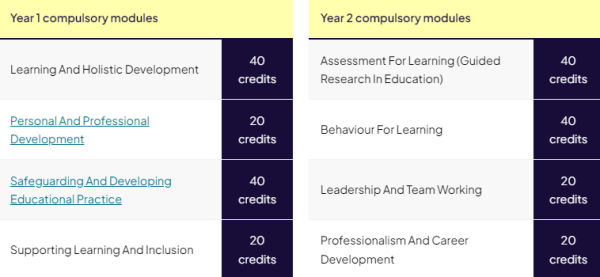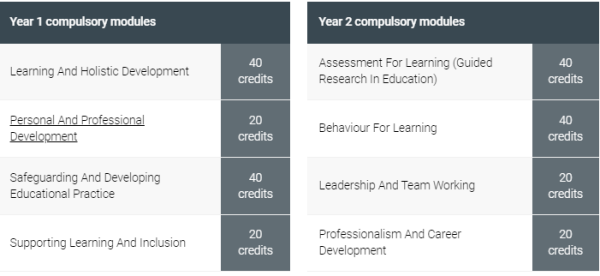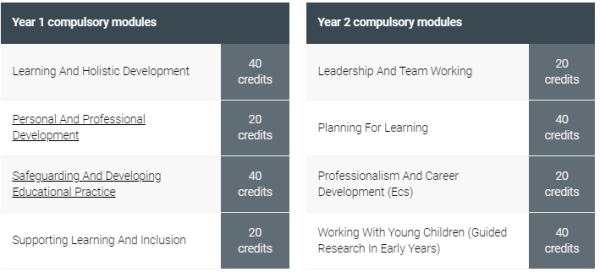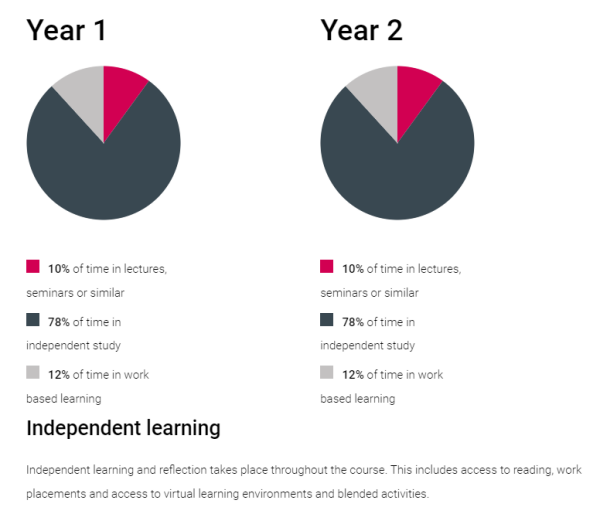Foundation Degree in Education
*Applications are now closed for 2025. Apply online for september 2026 via our "Apply Now" button.
This qualification is awarded by The University of Staffordshire. 
*This course runs on a Wednesday evening from 4.30pm - 8.30pm.
Are you keen on helping develop minds for the future? This may be the next step in fulfilling those aspirations, a Foundation Degree that offers comprehensive coverage of the knowledge and skills required by those supporting learning and teaching.
It is practically based and focused on the workplace. The course develops understanding of teaching and learning, working in education, and behaviour management. It also covers skills required for effective communication, self-development and career progression.
If you have an appropriate level 3 vocational early childhood studies qualification and are working in an early childhood setting you can choose to specialise in early childhood studies - this is a great way to tailor your award to your career aspirations, and further develop your knowledge of educational practice in an early years setting.
On successful completion of study, if you choose not to specialise, we will issue the following award: FdA Education. If you do specialise in early childhood studies, on successful completion you will be issued with the award of FdA Education (Early Childhood Studies).
Part-time study
This course is delivered one day per week on a wednesday evening from 4.30pm - 8.30pm and is a 2-year programme.
Work placements
Students on this course are normally working in schools or education settings, although those wishing to specialise in early childhood studies will normally work in an early childhood setting. Your existing workplace will make up your placement location.
Consequently a good deal of learning on this course will take place in the workplace using the experience of colleagues, observation, practice and reflective discussion.
Course content
This course which is awarded by The University of Staffordshire and will give you a deeper understanding of: up to date developments in the education sector; how to apply key theories and principles of education to your professional practice to meet the specific needs of your employer and your own personal development; wider professional and academic skills development to help secure your current employment and broaden your future career options.
The course therefore has the following overall aims, which focus on developing your career aspirations and opportunities to: become a ‘discipline expert’ in education; develop your professionalism; develop your wider professional practice; develop your independent thinking skills.
Modules
The tables provide an indicative list of the modules that make up the course for the current academic year. Each module is worth a specified number of credits. Our teaching is informed by research, and modules change periodically to reflect developments in the discipline. We aim to ensure that all modules run as scheduled. If for any reason a module cannot be run we will advise you as soon as possible and will provide guidance on selecting an appropriate alternative module where available.
Entry requirements
FdA Education pathway and FdA Education (Early Childhood Studies)* pathway.
All full-time applicants are individually assessed on their qualifications, skills and experience. However, you would normally..
- Demonstration of a clear Enhanced DBS check which confirms that there are no reasons why a candidate should not work with children.
- Be in employment (either paid or voluntary) within an educational setting
for at least four hours a week. - Have 64 UCAS points or hold an appropriate Level 3 with suitable work experience.
- GCSE qualifications in English and Maths or demonstration of a level 2 competence.
If English is not your first language you will be expected to have achieved an IELTS score of 6.0 or above.
* Eligibility to be counted in the EYFS staff: child ratios at level 3 requires you to hold a relevant EY Level 3 qualification, which should be gained prior to studying this pathway.
Careers
You can progress onto the BA (Hons) Education (Top Up) degree that may provide a route into PGCE qualification and teaching. If you choose to specialise in Early Childhood Studies you can also progress onto the BA (Hons) Education (Top Up) degree with Early Years specialism.
Graduates from this course have also secured promotions within their current roles, working within education.
Your degree isn't just about securing that all-important academic qualification. It’s about gaining life and work skills to help you get ahead in the job market and gain employers’ respect. As a graduate of awarding body The University of Staffordshire, you'll gain skills and attributes that will help you stand out from the crowd, and become an employable, enterprising and entrepreneurial individual.
Teaching and Assessment
Teaching
Students learn in different ways. To help everyone get the most out of their studies, a blended approach will offer flexibility of learning for students through the use of face-to-face and virtual lectures, workshops and group work. In addition, you will have timetabled meetings with your academic mentor.
Assessment
Your course will provide you with opportunities to test your understanding of your subject informally before you complete the formal assessments that count towards your final mark. Each module normally includes practice or ‘formative’ assessments, for which you receive feedback from your tutor. Practice assessments are developmental and any grades you receive for them do not count towards your module mark. There is a formal or ‘summative’ assessment at the end of each module. This includes a range of coursework assessments, such as essays, case studies, portfolios, presentations and a final year independent project.
Feedback
You will normally receive feedback on coursework assessments within 20 working days following the date of submission.
Fees
UK and Channel Island students: This tuition fee is agreed subject to UK government policy and parliamentary regulation. If the UK government passes appropriate legislation, the fee for subsequent years of study may increase in each academic year. But this increase will not exceed the rate of inflation as measured by RPIX**. Any change in fees will apply to both new and continuing students. The University will notify students of any change as early as possible. Further information about fee changes would be posted on the University’s website once this becomes available.
**RPIX is a measure of inflation equivalent to all the items in the Retail Price Index (RPI) excluding mortgage interest payments.




